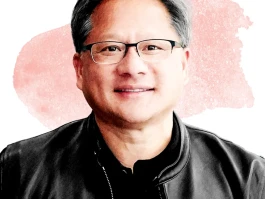Jensen's Gamble: Why Huawei's Rise is Nvidia's Rocket Fuel
Okay, let's be clear: Jensen Huang isn't just running a company; he's conducting an orchestra of innovation. And right now, the tempo is fast. The recent buzz around Nvidia cracking the $4 trillion market cap is more than just a financial headline; it's a signal that we're entering a new era of accelerated computing, an era where the stakes are higher, the competition is fiercer, and the potential rewards are almost unimaginable.
Huang's recent comments about Huawei aren't just corporate posturing; they're a masterclass in strategic foresight. He's essentially saying, "Don't sleep on Huawei, because their rise is pushing us to be even better." It's like the old saying: iron sharpens iron. Except in this case, it's silicon sharpening silicon, and the sparks are flying. The implication is staggering: the competition from Huawei is not a threat to Nvidia's dominance, but rather the very catalyst that will propel them to even greater heights, forcing them to innovate at an unprecedented pace.
Huang's acknowledgement of Huawei's prowess in 5G, chip design, and AI supercomputing is a critical piece of this puzzle. He isn’t downplaying the competition; he's highlighting it, amplifying it, and using it as a rallying cry for his own team. When he mentions CloudMatrix, Huawei’s AI supercomputing system, and says he “was not surprised that they were able to create such an amazing thing,” that's not just respect; it's a challenge—a gauntlet thrown down in the arena of technological supremacy. It's a recognition that true innovation thrives on pressure, on the relentless pursuit of excellence in the face of formidable rivals. As reported by the Times of India, Nvidia CEO Jensen Huang has issued a warning not to underestimate Huawei, stating, "Nvidia CEO Jensen Huang sends stern ‘Huawei’ warning: ‘It is foolish to…'" It's a sentiment that underscores the intensifying competition in the tech world.

What does this mean for us? It means we're about to witness an acceleration in AI development unlike anything we've seen before. Nvidia isn't going to rest on its laurels; it's going to push the boundaries of what's possible, driven by the very real and credible threat from Huawei. And that benefits everyone. Think about it: better AI chips, faster processing speeds, more efficient algorithms—all of these advancements will trickle down to every aspect of our lives, from healthcare to transportation to education. This is the kind of breakthrough that reminds me why I got into this field in the first place.
But let’s not get carried away without a moment of ethical consideration. With great power comes great responsibility. As AI becomes more pervasive, we need to ensure that it's developed and deployed in a way that benefits humanity as a whole, not just a select few. We need to address the potential risks of bias, discrimination, and misuse, and we need to have open and honest conversations about the ethical implications of this technology.
Now, some might say that Huang is simply trying to downplay the threat from Huawei, that he's putting on a brave face in the face of growing competition. But I see something different. I see a leader who understands that true innovation comes from embracing challenges, from pushing oneself to the limit, and from never underestimating the competition. He is playing 4D chess, leveraging the narrative of competition to fuel his own company's ambitions.
The Future is Being Written, Chip by Chip
The competitive spirit, the relentless pursuit of innovation, that's what truly matters. And that's why I'm so excited about what's to come. Because if Nvidia and Huawei are locked in a battle for technological supremacy, then we all win.


